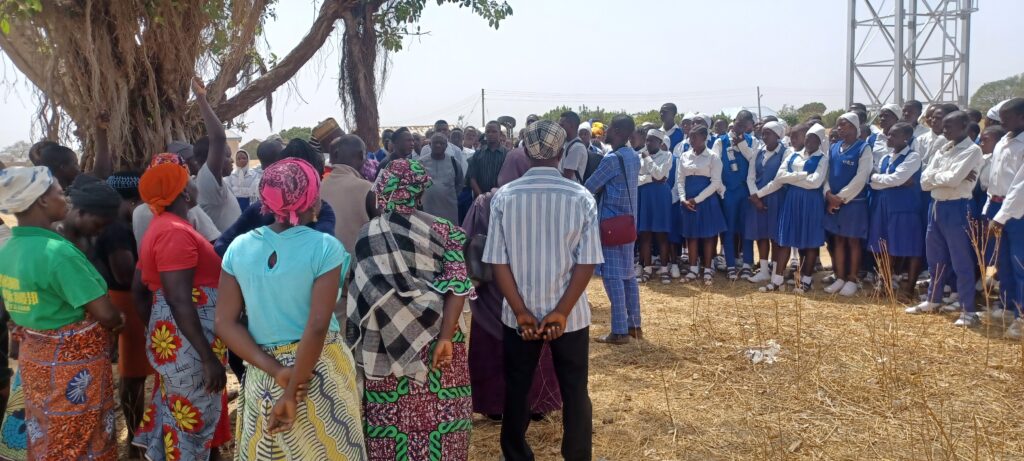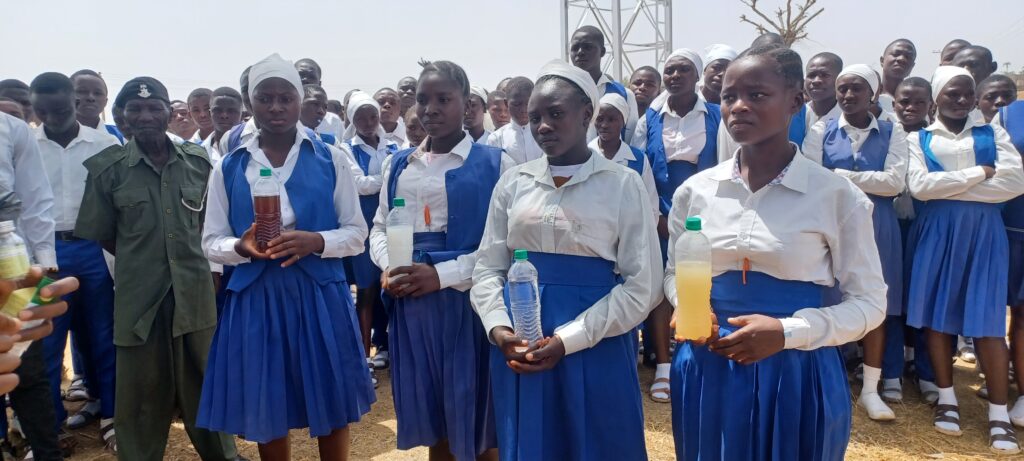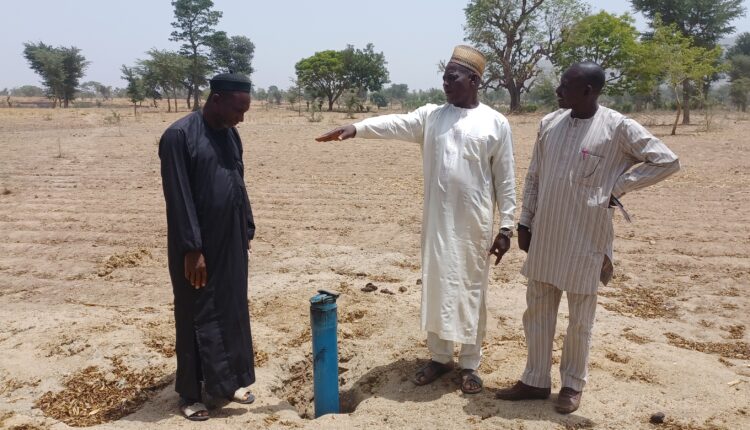Dasham Bakin Kogi: Community close to civilization, modernization, yet, far away
|
Getting your Trinity Audio player ready...
|
The village Head of Dasham Bakin Kogi, Mr Yunana Joshua (left) and Community Development Association Chairman, Simon Arbe conduct members of WASH Media round the borehole.
By Akanji Olowolodu, Bauchi
For the inhabitants of Dasham Bakin Kogi, a village settlement in Tafawa Balewa LGA of Bauchi State, it is a case of close to modernization and civilization, but yet, very far away from any of the two situations considering the fact that the people on a daily basis, treck 3 km to get water for both domestic and other uses.
Dasham Bakin Kogi is strategically located on the ever busy Bauchi – Kabwir Federal highway linking Bauchi and Plateau States, in fact, it is the border town between the two states and it is predominantly inhabited by Ngas tribe with a handful of Fulani cattle rearers.
The People of the village are predominantly farmers, they engage in farming all through the year, on and off season because of the good arable land that nature has bestowed them with. They are hardworking and industrious, they are very proud of that and can boast it anywhere they are found.
Though they are easily accessible because of the good road network, considering the fact that the village is situated on the major highway, the residents are groaning after lack of good source of water for both domestic and other uses. As it is now, the people and animals, take turn to get water from the only source, the river that flows but always dried during the dry season of the year.
Year in, year out, 22nd March of every year is being globally observed as World Water Day (WWD). It was a day set aside by the United Nations (UN) to bring attention of the World on challenges of accessing potable water by humans. Selecting a day set aside by the UN to project the role of water in the lives of human beings, animals, plants etc re-echoes the saying that “Water is Life”.
Sadly, as important as water is in our lives, communities, especially those in developing countries are still grappling on how to overcome the challenges of accessing this important component of human survival with little success.
According to a new analysis carried out by UNICEF, 78 million children in Nigeria are at the highest risk from a convergence of three water-related threats – inadequate water, sanitation, and hygiene (WASH); related diseases; and climate hazards.

A section of members of Dasham Bakin Kogi community
The statement said that in Nigeria, one-third of children do not have access to at least basic water at home, and two-thirds do not have basic sanitation services. Hand hygiene is also limited, with three-quarters of children unable to wash their hands due to lack of water and soap at home. As a result, Nigeria is one of the 10 countries that carry the heaviest burden of child deaths from diseases caused by inadequate WASH, such as diarrhoeal diseases.
Again UNICEF Nigeria, while marking WWD some few years back said “children without access to safe water are more likely to die in infancy and throughout childhood from waterborne diseases. Diarrhea remains the leading cause of death among children under five years of age in Nigeria. Waterborne diseases also contribute to stunting. A stunted child is shorter than she or he could have been and will never be able to reach her or his full cognitive potential. Lack of safe water and sanitation also makes children vulnerable to other threats beyond health. Many children in rural areas spend hours daily collecting water, missing out on the opportunity to go to school”.
One may not fully comprehend the negative effects of the above analysis until he or she actually sees it physically as communities struggle to get potable water for consumption and other domestic uses.
Recently, just few days after the Commemoration of the WWD 2023, a select group of Journalists from Bauchi State under the aegis of WASH Media, under the implementation of a CSO, Women Development Association for Self Sustainance (WODASS) in collaboration with Rural Water and Sanitation Agency (RUWASSA) with funding from WaterAid Nigeria were on a field visit to Dasham Bakin Kogi community in the state to ascertain the level of pain and despair the citizens are encountering in trying to access potable water for living a meaningful lives.
With an estimate of over 6 million people, whose larger population lives in semi- urban and rural areas, access to potable water in Bauchi State is grossly inadequate, thus subjecting the people, especially those in the rural areas, to untold hardship and loss of productive manpower hours in the course of looking to fetching water.
The cows taking turn to drink from the dug pond
In Bauchi State, according to Multiple Indicator Cluster Survey of 2021 (MICS 2021), access to improved sources of drinking water is 55.9 percent, while use of basic drinking water services stands at 55.3 percent, which is below the Region’s and National average.
A first time visit to Dasham Bakin Kogi will present a sight of a community that is enjoying life considering the visibility of electricity poles with service cables, schools, health facilities, shops and other things that make a lively community, but, beneath those, is that agony of lack of good sources of good water, the residents are always groaning.
Investigations revealed that the only period the people of Dasham Bakin Kogi are happy and enthusiastic is during the raining season when water is in abundance, in fact, they have become experts in rain water harvesting for use.
While interacting with the Journalists, the Village Head of Dasham Bakin Kogi, Mr Yunana Joshua lamented that, “We have existed like this for years, lack of good sources of good water has remained a cause of concern for us here. We are very close to civilization, modernization but yet, we are far away from the two aspect of life.”
He stressed that, “As you can see, we are situated on the major Federal highway that links Bauchi and Plateau States, in fact we are the gateway to both states. We have electricity supply, schools, health facilities and other things but the king of it all – water, is not easily and readily available for us.”
A worried traditional ruler said that,”The situation is worst now that everywhere is dried up, the river is dried, our youths on a daily basis will go to the dried river to dig out sands in order to get water. Our children use the whole day fetching the water home. The sad thing is that cows will just come, chase the people away in order to get water to drink. In the process, they cover up the dug site with sands. It is such a pathetic situation.”
He added that the situation has negatively impacted on the issue of Education and health as students have to go looking for water everyday, thereby losing hours that they would have spent studying in the school while the heath facility cannot function well without water supply.
Though WaterAid Nigeria has intervened by commencing the process of drilling a solar powered borehole in the community, he want the project to be expanded to reach the entire community.
Also speaking on the problem, Chairman of Dasham Bakin Kogi Community Development Association, Simon Wokdima Arbe lamented that for years, the lack of sources of good water has retarded development of the community which though semi-urban has suffered neglect.
Simon Wokdims said that as an Association, members have been doing their best in ensuring that wells are dug at different strategic locations around the town to reduce the burden saying however that during the dry season, the suffering of the people get to the peak.
He corroborated what the Village Head said that social interaction is at the lowest ebb in the area due to lack of adequate clean water for use by the people a development he said has made life unbearable for the people.
He too commended the efforts of WaterAid Nigeria, RUWASSA, WODASS and other relevant agencies for coming to the aid of the people by drilling a solar powered borehole saying that it should be extended to other parts of the village.
The Principal of Government Secondary school in the Village lamented that the lack of good water has negatively impacted on Education as students normally come to school very or in some cases, they don’t come to school at all going about to look for water.
He appealed to the concerned authorities to come to the aid of the students by making water readily available saying that the female students are the worst hit considering the fact that they constantly need water to keep clean always especially during their menstrual cycle.
In a brief sensitization campaign, Bashir Shuaibu of RUWASSA told the community members to ensure that the sources of the water they are using for now before the completion of the borehole are good and clean.
He warned them against using just any water source stressing that good water is not from the physical looks and colour but from testing to ascertain its nutrients quality just as he also educated them that there must be not less than 40 feet between a pit latrine and a well within the same con compound in order to avoid contamination.

Also speaking at the occasion, Aisha Aliyu from RUWASSA stressed the need for the raising of different flags (yellow and red) to determine the state of the water situation in the community.
She particularly called on women to ensure that the source of water they are using are good and healthy stressing that as women, the duty of protecting the family lies on them.
Magaji Barde of WODASS in his remarks said that good source of water must be ensured in every household in order to reduce the risk of getting infected by water borne diseases and assured that RUWASSA and WODASS through funding by WaterAid Nigeria will continue to ensure that the community has good source of portable drinking water.


